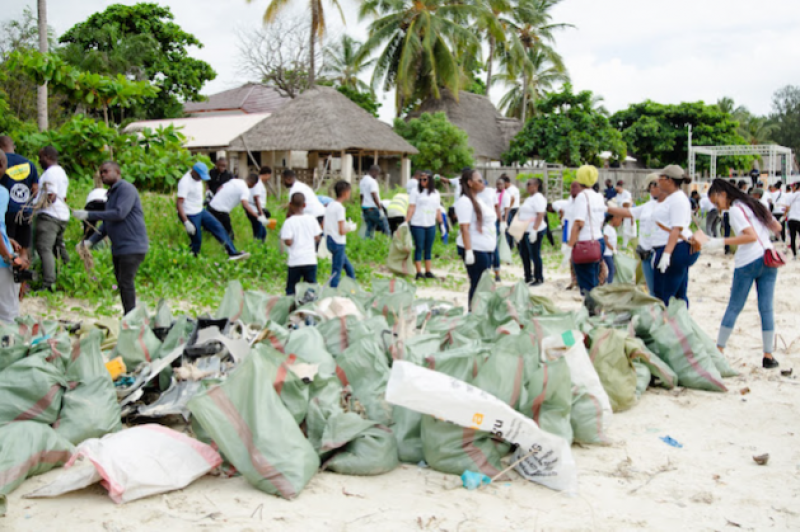- India Sees 9% Drop in Foreign Tourists as Bangladesh Visits Plunge |
- Dhaka Urges Restraint in Pakistan-Afghan War |
- Guterres Urges Action on Safe Migration Pact |
- OpenAI Raises $110B in Amazon-Led Funding |
- Puppet show enchants Children as Boi Mela comes alive on day 2 |
UNOC Spurs Global Drive to Boost Ocean Protection, Funding

As delegates prepare for the third United Nations Ocean Conference (UNOC) in Nice, France, momentum is building around ocean governance, finance for marine conservation, and an urgent shift toward a regenerative blue economy. Ocean advocates say the world is at a critical juncture—and the next few weeks could shape the future of marine protection for decades.
“Oceans sustain all life on Earth,” said Rita El Zaghloul, Senior Programme Manager at the High Ambition Coalition for Nature and People. “Protecting our oceans is fundamental for food security, cultural heritage, and our economies and livelihoods.”
El Zaghloul cited new data from the OECD showing that the ocean economy, if treated as a single country, would have ranked as the world’s fifth-largest economy in 2019. It provides food for 3.2 billion people and contributes $2.6 trillion to global GDP each year.
Despite this, only 8.4 percent of the ocean is currently under formal protection. Advocates say that figure must rise to at least 30% by 2030—a goal enshrined in the Global Biodiversity Framework and reaffirmed by the 2023 High Seas Treaty, also known as the BBNJ (Biodiversity Beyond National Jurisdiction) Treaty.
“Let us not forget that discussions on this treaty started eight years ago,” El Zaghloul said. “To enter into force, we need at least 60 ratifications. So far, we have only 21. UNOC represents a key milestone to change that.”
Activists and policymakers alike are calling for a clear shift from pledges to implementation.
“We are only five years away from 2030,” warned El Zaghloul. “We must move beyond rhetoric.”
Examples of effective action are emerging across the globe. El Zaghloul highlighted several: the Eastern Tropical Pacific Marine Corridor—a collaborative effort between Ecuador, Costa Rica, Colombia, and Panama—has connected five marine protected areas to strengthen ecosystem management. The Marshall Islands has designated a marine area larger than Switzerland as a no-fishing zone. And in 2024, Australia expanded a marine reserve to cover over 52 percent of its national waters.
“These examples show that progress is possible—regardless of income level,” El Zaghloul said. “But of course, much more is needed.”
“We really need to make sure that finance is directly reaching the coastal communities working to safeguard our oceans,” she added. “From the HAC perspective, we’ve launched a rapid deployment mechanism offering small grants between USD 25,000 and USD 50,000 as seed funding. But of course, that’s only a start.”
Kristin Rechberger, CEO of Dynamic Planet and co-organiser of Monaco’s Blue Economy Finance Forum (BEFF), echoed the need to rethink the role of private finance in ocean conservation.
“For too long, extraction and pollution have been the business model, with little investment in protection or regeneration,” Rechberger said. “We need to create a new regenerative ocean economy that puts conservation at its heart.”
Rechberger said a new study shows that to achieve the 30×30 goal, 190,000 small marine protected areas must be established within the next five years—just within territorial waters.
“That requires smart programming, investment products, and scalable initiatives that restore marine life and generate returns,” she said. “This isn’t just an environmental issue—it’s an economic opportunity.”
Rechberger’s initiative, Revive Our Ocean, brings together proven partners working to demonstrate that marine protection can lead to coastal prosperity. She also pointed to the upcoming Ocean, Coastal Resilience, and Risk conference in Nice—slated to bring mayors and governors into the conversation.
“Some local leaders are already protecting coastlines and reaping the benefits through increased climate resilience and tourism,” she said. “We hope many more follow.”
France, the host of the upcoming UNOC, has pledged strong support. The French government, backed by HAC and other organisations, is pushing for new marine protected area announcements at the conference.
“We’re working to move from 8.4% to something closer to 30%,” said El Zaghloul. “But it’s not just about expanding coverage—we need to make sure these areas are effectively managed, inclusive, and resilient.”
El Zaghloul concluded with a call for unity: “We must ensure ministers and technical experts are aligned to push for more ambition. We need to quadruple ocean protection—and do so inclusively and effectively.”
Filimon Manoni, the Pacific Ocean Commissioner, has underscored the region’s unwavering commitment to ocean governance and climate resilience. Despite being home to small island nations, the Pacific has long been a global leader in marine protection—from advancing Sustainable Development Goal 14 to spearheading community-led marine conservation efforts.
“We take this opportunity very seriously,” Manoni said, emphasising that the conference provides a rare platform for Pacific nations to voice their ocean-climate concerns, which are often sidelined at global climate talks.
At the heart of the Pacific’s agenda is the urgent call for ratification of the Biodiversity Beyond National Jurisdiction (BBNJ) Agreement—a crucial step toward ending lawlessness in the high seas. Manoni warned that ongoing inaction could jeopardise years of marine conservation within national waters. He also called for a binding global plastics treaty and a reevaluation of global trade systems that continue to fuel ocean pollution.
“We, the small island developing states, continue to carry the burden of plastic waste,” he said, pointing to the need for systemic changes in international commerce to curb marine degradation.
The UNOC in Nice promises to be a pivotal moment. Whether it succeeds will depend not only on bold declarations but on the tangible steps taken afterward. For the world’s oceans—and the billions who depend on them—the stakes could not be higher.

